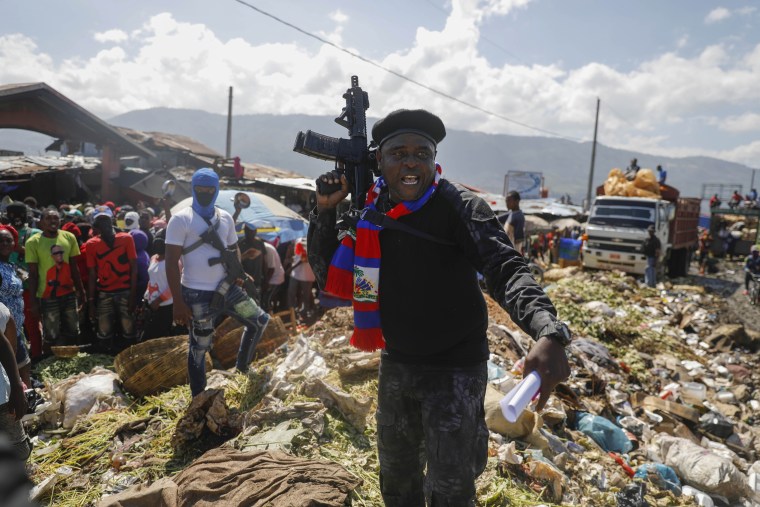Jimmy Chérizier, the former Haitian police officer-turned-gangster leading the latest violent campaign to seize control of the country, is nicknamed “Barbeque.”
Chérizier insists it’s because his mother operated a fried chicken stand in the slums of Port-au-Prince.
But critics say it’s a moniker Chérizier earned after staging multiple massacres in the nation’s capital from 2018 to 2020 that, according to the United Nations, left dozens of people dead, many of whom were burned alive when their homes were deliberately torched.

“I would never massacre people in the same social class as me,” Chérizier said in a 2019 interview with The Associated Press. “I was born next door to La Saline. I live in the ghetto. I know what ghetto life is.”
But clad in what’s become his trademark bullet-proof vest, Chérizier has made it clear in more recent interviews that he’s willing to shed a lot of blood to achieve his goals.
“We won’t lie to people, saying we have a peaceful revolution,” he told the Reuters news agency on Tuesday. “We do not have a peaceful revolution. We are starting a bloody revolution in the country.”
One of the first casualties of Chérizier’s bloody revolution was Prime Minister Ariel Henry, who said Tuesday that he would resign and his government would dissolve once a transitional council had been set up.
Henry’s announcement came after Chérizier and a coalition of armed gangs loyal to him known as G9 seized control of large swaths of Port-au-Prince.
His forces have laid siege to Haiti’s main international airport, traded fire with troops at government sites, and sparked a mass jailbreak last week from the National Penitentiary in Port-Au-Prince that freed almost 4,000 gang members.
A team of Marines has been dispatched to shore-up security at the U.S. Embassy.
While Henry’s departure was a key demand of G9, Chérizier has given no sign that he intends to cede power to anybody else.
In interviews, Chérizier has likened himself to Martin Luther King Jr., Malcolm X, Fidel Castro, even Robin Hood. He is also an admirer of Haitian dictator Francois “Papa Doc” Duvalier, who ruled the country with an iron hand from 1957 to 1971.
“It’s clear that he has a messianic vision of his role in Haiti,” Robert Fatton Jr., a professor of politics at the University of Virginia and an expert on Haiti, told NBC News recently. “He presents himself as such.”
Chérizier is also closely allied with the Haitian Tèt Kale Party (PHTK), one of the most powerful political parties in the country, according to InSight Crime, a nonprofit that covers organized crime in Latin America and the Caribbean.
While Henry remains marooned in Puerto Rico and unable to return home because of the latest outbreak of violence, Chérizier has been filling the power vacuum.
Haiti’s latest strongman
Believed to be 48 or 49, Chérizier is from the impoverished Port-au-Prince neighborhood of Lower Delmas. The youngest of eight children, he was 5 when his father died and his mother ran the chicken stand to support the family.
Before Chérizier became the latest strongman vying to take power in Haiti, he was an officer in the Haitian National Police, according to a U.N. sanctions notice dated Oct. 21, 2022.
While still serving in the HNP, Chérizier “planned and participated in the November 2018 deadly attack against civilians in a Port-au-Prince neighborhood known as La Saline.”
At least 71 people were killed, more than 400 houses were destroyed “and at least seven women were raped by armed gangs,” the U.N. sanctions notice said.
It was Haiti’s worst massacre in a decade. Chérizier was fired and a warrant was issued for his arrest, local Haitian media reported. And for that, he was branded in 2020 a human rights abuser by the U.S. Treasury Department.
But Chérizier managed to avoid arrest.
Over the next two years, Chérizier led “armed groups in coordinated, brutal attacks” in various Port-au-Prince neighborhoods “in which civilians were killed and houses were set on fire,” the U.N. said.
The weapons, vehicles and police uniforms that Chérizier used to stage these massacres came, according to InSight Crime, from top officials in the government of President Jovenel Moïse, who was assassinated in 2021.
Since Oct. 11, 2022, Chérizier and his forces have been blocking fuel supplies from the country’s largest terminal from getting to hard-pressed Haitians.
“His actions have directly contributed to the economic paralysis and humanitarian crisis in Haiti,” the U.N. said.











